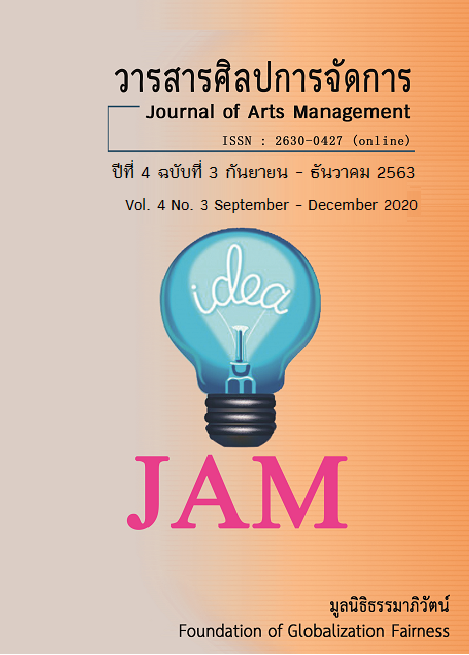A Comparative Study of Organizational Culture between Secondary School and Educational Opportunity Expansion School
Main Article Content
Abstract
The purposes of this research were to determine 1) the organizational culture of secondary school and educational opportunity expansion school, and 2) the result of comparison of organizational culture between secondary school and educational opportunity expansion school. The sample of this research was secondary schools and educational opportunity expansion schools under the Office of the Basic Education Commission in 8 provinces consisted of Nakhon Pathom, Suphanburi, Kanchanaburi, Ratchaburi, Samut Sakhon, Samut Songkhram, Phetchaburi and Prachuap Khiri Khan, totally 169 schools. There were 3 respondents from each school; School Director, Deputy Director, and not under Professional Level Teachers, including 507 respondents. The research instrument was the semi-structured interview and the opinionnaire. The statistical analysis were frequency, percentage, arithmetic mean, standard division, exploratory factor analysis, and t-test. The findings revealed that;
- The organizational culture of secondary school and educational opportunity expansion school were composed of 5 factors: Work process, Work achievement, Individualize aspect, Satisfaction of work and, Development of work.
- The comparison of organizational culture in overall, there was no difference in every factor. The comparison of variables in each factor, there was no difference on Individualize aspect and Satisfaction of work. As for Work process, Work achievement and Development of work, there were statistically significantly different at .05 level on 10 variables.
Article Details
Views and opinions appearing in articles in the Journal of Arts of Management It is the responsibility of the author of the article. and does not constitute the view and responsibility of the editorial team I agree that the article is copyright of the Arts and Management Journal.
References
ชนิดา จิตตรุทธะ. (2549). ความสอดคล้องระหว่างวัฒนธรรมองค์การกับวัฒนธรรมปัจเจกบุคคลในการรับรู้ของสมาชิกองค์การ: ศึกษากรณีองค์การภาครัฐ องค์การเอกชน และองค์การภาคประชาสังคมในประเทศไทย. (ปริญญารัฐประศาสนศาสตรดุษฎีบัณฑิต). จุฬาลงกรณ์มหาวิทยาลัย.
ณัฐวรรณ พุ่มดียิ่ง. (2556). วัฒนธรรมองค์การของมหาวิทยาลัยราชภัฏ. (ปริญญาปรัชญาดุษฎีบัณฑิต สาขาวิชาการบริหารการศึกษา). มหาวิทยาลัยศิลปากร.
ดาวรุวรรณ ถวิลการ. (2552). วัฒนธรรมองค์การในโรงเรียนรางวัลพระราชทาน: การวิจัยเชิงชาติพันธุ์วรรณนา. (ปริญญาปรัชญาดุษฎีบัณฑิต สาขาวิชาการบริหารการศึกษา). มหาวิทยาลัยขอนแก่น.
นฤชล คุ้มกลาง. (2560). ภาวะผู้นำการเปลี่ยนแปลงที่ส่งผลต่อวัฒนธรรมองค์การลักษณะเชิงสร้างสรรค์ของผู้อำนวยการโรงเรียนในสำนักงานเขตพื้นที่การศึกษาประถมศึกษานครราชสีมาเขต 1 : กรณีศึกษาโรงเรียนในเขตเทศบาลนครนครราชสีมา. (ปริญญาบริหารธุรกิจมหาบัณฑิต). มหาวิทยาลัยเทคโนโลยีราชมงคลอีสาน.
นริศย์ จำปา. (2556). วัฒนธรรมองค์การที่มีผลต่อการปฏิบัติงานของพนักงานธนาคารเพื่อการเกษตรและสหกรณ์การเกษตร (ธ.ก.ส.) จังหวัดระนอง. (ปริญญารัฐประศาสนศาสตรมหาบัณฑิต สาขาวิชาการบริหารทั่วไป). มหาวิทยาลัยบูรพา.
ปิยะ ละมูลมอญ. (2556). วัฒนธรรมองค์การที่ส่งผลต่อการเป็นองค์การแห่งการเรียนรู้ของสถานศึกษา สังกัดสำนักงานเขตพื้นที่การศึกษาประถมศึกษาปทุมธานี เขต 1. (ปริญญาศึกษาศาสตรมหาบัณฑิต สาขาวิชาเทคโนโลยีการบริหารการศึกษา). มหาวิทยาลัยเทคโนโลยีราชมงคลธัญบุรี.
รสพร ทองธรรมจินดา. (2554). การปรับเปลี่ยนวัฒนธรรมองค์การที่ส่งผลต่อการส่งเสริมการวิจัยในโรงเรียน. (ปริญญาปรัชญาดุษฎีบัณฑิต สาขาวิชาการบริหารการศึกษา). มหาวิทยาลัยศิลปากร.
ลลิตา พลซื่อ. (2558). การศึกษาวัฒนธรรมองค์การ ภาวะผู้นำของผู้บริหาร และความผูกพันต่อองค์การที่มีผลต่อการตั้งใจลาออกของพนักงานในกลุ่มบริษัทอุตสาหกรรมเครื่องสำอาง. (ปริญญาบริหารธุรกิจมหาบัณฑิต). มหาวิทยาลัยกรุงเทพ.
ศิริวรรณ เสรีรัตน์. (2545). ทฤษีองค์การ. กรุงเทพฯ: ธรรมสาร.
สถาบันส่งเสริมการสอนวิทยาศาสตร์และเทคโนโลยี, กระทรวงศึกษาธิการ. (2562). รายงานผลการประเมิน PISA 2018 ในระดับนานาชาติ. กรุงเทพฯ: สถาบันส่งเสริมการสอนวิทยาศาสตร์และเทคโนโลยี.
สำนักงานเลขาธิการสภาการศึกษา. (2560). แผนการศึกษาแห่งชาติ พ.ศ. 2560-2579. กรุงเทพฯ: พริกหวานกราฟฟิค.
สำนักงานคณะกรรมการพัฒนาการเศรษฐกิจและสังคมแห่งชาติ, สำนักนายกรัฐมนตรี. (2560). แผนพัฒนาเศรษฐกิจและสังคมแห่งชาติ ฉบับที่สิบสอง พ.ศ. 2560 – 2564. กรุงเทพฯ: สำนักงานคณะกรรมการพัฒนาการเศรษฐกิจและสังคมแห่งชาติ.
สุวิสา พลายแก้ว. (2557). วัฒนธรรมองค์การ ความผูกพันต่อองค์การที่ส่งผลต่อประสิทธิผลการปฏิบัติงานของบุคลากรในกองทัพอากาศ. (ปริญญาบริหารธุรกิจดุษฎีบัณฑิต). มหาวิทยาลัยรังสิต.
Bashayreh, A. M. et al. (2016). Prevailing Organizational Culture and Effect on Academic Staff Satisfaction in the Malaysian Higher Education Institutes. Business Administration Department University of Petra. Malaysia.
Dobre Ovidiu-Iliuta. (2014) The link between Organizational culture and performance management practices: A case of IT companies from Romania. The Bucharest University of Economic Studies (Institute of Doctoral Studies, Business Administration), Bucharest. Romania.
Handy, C. B. (1981). Understanding Organizations. Penguin Books: Harmondsworth.
Kamaamia, A. T. (2016). The Effect of Organizational Culture on Organizational Performance: A Case of Kenya School of Monetary Studies (Ksms). United States International University. Africa.
Makau, B. K. (2014). Influence of Organizational culture on teachers’ job Commitment in primary schools in Mwingi central district, Kenya. Department of Educational Administration and Planning University of Nairobi. Kenya.
Maslowski, R. (2001). School culture and school performance: an explorative study into the organizational culture of secondary schools and their effects. Enschede: Twente University Press (TUP).
Patterson, R. G. (1988). School culture. San Francisco: Jersey Bass.
Pirzada Sami Ullah Sabri et al. (2011). Organizational Culture and Its Impact on the Job Satisfaction of the University Teachers of Lahore. Human Resource Management. Superior College, Lahore. Pakistan.
Uğurlu, C. T. (2009). The significance of school culture in elementary schools in terms of organizational development. Procedia-Social and Behavioral Sciences, 1(1), 1003-1007.


